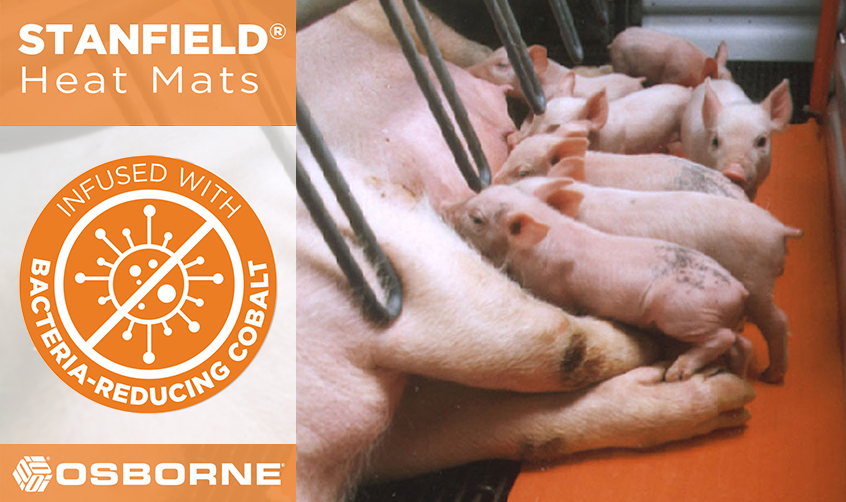



British vets urge sow crate ban over animal welfare concerns
BVA calls for 15-year transition to higher-welfare farrowing systemsThe British Veterinary Association (BVA) is calling for a ban on the use of farrowing crates, which are widely used in commercial farming to restrict the movement of female pigs, before and for weeks after they have given birth, to protect the piglets from being crushed. The call comes as new statistics show that nearly three quarters (73%) of vets are concerned about their negative impacts on animal welfare.
Farrowing crates were introduced in the 1960s with the aim of reducing the number of piglets being accidentally crushed by female pigs (sows), which can weigh up to 300kg in comparison to the average piglet, which typically weigh less than 2kg. The crates are small enough to prevent the sow from turning around by restricting her movement and are commonly used from up to a week before giving birth until the piglets are weaned at around four weeks old. Approximately 60% of UK sows are kept in farrowing crates during this time.
New statistics from the British Veterinary Association’s Voice of the Veterinary Profession survey have revealed that nearly 75% of vets are concerned about the impact of farrowing crates on the welfare of pigs, with 36% of these vets saying they were very concerned.
Although contemporary farrowing crates reduce crushing, a fifth of vets (20%) are concerned that the crates are so small as to inhibit the sows’ ability to perform natural behaviors, such as turning around, moving freely or going outside, while 9% reported being concerned that the crates prioritise the health of piglets over the welfare of sows.
The British Veterinary Association and Pig Veterinary Society (PVS) are now calling for a gradual phase out of farrowing crates, with a new policy position outlining the issues and recommendations for change, which include:
- Farrowing crates in their current form should be banned and replaced by a system that maximises sow and piglet welfare and ensures human safety.
- A clearly mapped out 15-year transition period should be implemented and, unless already agreed upon, no more of the current farrowing crates should be put into use. The position encourages new build farrowing buildings to either be a form of adaptive farrowing accommodation or free farrowing.
- The stages of shifting away from the current system to the new system must be clearly laid out and adequately funded by the UK Government and the governments of the devolved nations where appropriate. Any transition away must factor in the direction of travel in the EU to ensure symmetry and equal opportunities for UK producers.
- UK Government, the governments of the devolved nations and supermarket retailers should also carry out an awareness raising campaign around farrowing systems and the incoming changes to inform consumers ahead of the ban and during the transition period.
- During the transition period, there should be shared learning of best practice to enable farmers and producers to confidently and competently support animal welfare in the new farrowing accommodations.
“Whilst farrowing crates protect some aspects of the welfare of piglets, this controversial safeguarding method comes at the expense of the sows who are forced to live with restrictions on their natural behaviours and movements for extended periods of time," said British Veterinary Association president Elizabeth Mullineaux. "It’s time for change and working closely with the Pig Veterinary Society (PVS) we’ve created a balanced, pragmatic, and evidence-led position which calls on the UK Government to move towards a total ban of their use."
"It will however take time for the industry to adapt and we’re recommending a transition period of up to fifteen years, backed by sufficient resource, to support producers to shift to either adaptive farrowing accommodation, with a significantly reduced confinement time for sows, or free farrowing," she added. "The UK is known across the world for our high standards of animal welfare and we must take action now to move away from this outdated system."
"We want the UK’s sows to have as good a life as possible but it is clear that traditional farrowing crates restrict the ability of farrowing and nursing sows to perform many normal behaviours," said Dan Tucker, Pig Veterinary Society (PVS) president. "There is now sufficient research-based evidence to support systems that optimise the balance between the sows’ needs, piglet health and welfare, and also stock keeper safety."
"Implementation of these new farrowing systems needs to be at a pace that allows producers to work with their veterinarians in optimising best management practice; the goal being to minimise and ultimately negate any compromise to piglets or stock keeper safety associated with this increased sow freedom," Tucker added. "The UK pig industry has a long reputation of leading in welfare as demonstrated by the gestation crate ban; the UK was one of the first European countries to adopt the ban even though it made the UK uncompetitive in the common market. A phased transition will avoid the potential for economic shocks that would undermine the longstanding efforts of UK producers, and risk increased exposure of the UK market to imported pig meat produced at lower welfare standards. PVS supports the transition away from total farrowing confinement but it needs to be done in conjunction with financial support from government and retailers."











